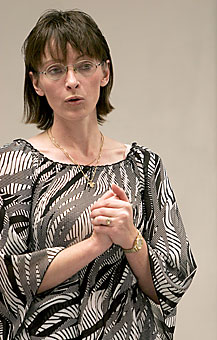 |
|
JACOB KONST/Arizona Daily Wildcat
|
Flora Jessop escaped from an incestuous polygamist upbringing and more than 20 years ago in Colorado City. Jessop now works as a child victim advocate in an effort to assist people escaping abuse.
|
|
|
By Djamila Noelle Grossman
Arizona Daily Wildcat
Monday, April 25, 2005
Print this
The only right they have is to obey their husbands - who have multiple other wives. Their babies are born without limbs and other mutations because the father has been a close relative for many generations.
They don't know the words "I," "me" or "fun," and they have no identity. Those women and children live in Colorado City, Ariz.
Flora Jessop, a child victim advocate with the Child Protection Project, started Friday's lecture on polygamy and child abuse at the James E. Rogers College of Law with an exercise.
"Imagine having an extra room for your husband to make love with your sister, mother, daughter or best friend," she said.
Jessop, who grew up in Colorado City, escaped the community more than 20 years ago and is now fighting to liberate the women and children in the city.
There is documentation of polygamous communities in 38 states, Jessop said, who are religious, racist and have no contact with the "world outside."
These communities are growing rapidly, Jessop said, who has 28 brothers and sisters.
Women are required to have as many children as they possibly can, Jessop said. A woman has 17 children on average, and some men have as many as 70 wives.
"You are female, you have babies," Jessop said. "My mother's innards fell out when she had her last child."
Anyone born into the community has no rights and no identity - all they have is the church, Jessop said.
Children grow up believing society is evil, and they will bleed to death if they tell anyone about the misuse, Jessop said, which is why only very few dare to escape.
Laurene Jessop said she is one of the few who escaped Colorado City five years ago after being institutionalized in Flagstaff four times for rebelling against her husband.
The mother of five children said she has 56 brothers and sisters, and was married at age 14 to a husband who then also married her sister.
"You don't have choices, you are told who to marry," Laurene Jessop said. "We are here in Arizona, we are here in America, but we are locked up."
Getting married between ages 14 and 16 is no surprise, and the youngest girl to be married was 8 years old, Flora Jessop said.
Laurene Jessop was homeless after her escape, but she said fleeing was the only right thing to do.
She had difficulties in building a life "outside," Laurene Jessop said, because there were many rules she was still forced to follow.
Women in Colorado City are not allowed to laugh, they cannot cut their hair, and they have to wear a dress at all times with full-body underwear.
They are told their bodies are disgusting and they are not allowed to touch them, Laurene Jessop said, and many women have genital infections because they only wash their hair.
Laurene Jessop said she signed the custody of her children to her husband when she was put on drugs in the institution, but she now has her children back with the help of the organization Justice for Children and Flora Jessop.
The children have a hard time adapting to society, Laurene Jessop said, because they do not know the words "I," "me" or "fun" and do not believe their mother, because she is "the wicked one," who ran away.
Donnalee Sarda, a regional director of the Arizona Chapter of Justice for children, referred to Colorado City inhabitants as a "special population that is brainwashed" and said they cannot be treated as normal citizens when they escape the community.
Sarda said the case is new to the legal system, and no one knew about the community in Arizona because of their geographical and social isolation.
Jane Irvine, the director of the office for children, youth and families in the Attorney General's office in Maricopa County, said she works closely with law enforcement but is still waiting for laws to catch up.
Irvine said Arizona has worked hard to collaborate with Utah to enable synchronic law enforcement and the goal is to decrease bureaucratic detours to help the victims immediately.
The most difficult but badly needed task is to convince the victims to speak out in court, Irvine said, but most of them are too scared and think they will go to hell.
Most victims feel deprived of help, Flora Jessop said, and bureaucracy ties their hands.
"They say if we help one of them, we have to help them all," Laurene Jessop said regarding the legal system. "There are no resources, and it's a lack of money why they don't prosecute."
Irvine called the case a challenge and said it is something they are just learning about.
"Change is coming," Irvine said. "I hope it's in our lifetime."
Sara Ransom, a third-year law student, said she organized the lecture because she wanted to raise awareness about something that few people know about.
"This is a human rights violation going on in my state," Ransom said. "And nothing is done about it."
Laura Dubrish, a communications senior, said she was shocked when she heard what the women had to endure and said something has to be done.
Dubrish called for zero tolerance of this behavior and questioned the gap in the legal system that allowed for the community to exist.
"I was disgusted," Dubrish said. "This is very uncivilized, very anti-American."
